#SecurityScan 99: Instability in India’s Neighborhood, Turning Point in the Syrian Civil War & more
11 Dec 2024 18:01:41
This article is a summary of important events that have taken place in last one week affecting, India's national security.
Countering external & Internal Security Challenges
COUNTERING THE WESTERN DEEP STATE
Pro-Khalistan Event Raises Questions on Labour's Stance
Several lawmakers from Britain's ruling Labour Party, including a key aide to the UK Trade Secretary, attended a Gurpurab event organized by a pro-Khalistan group. Held within the UK Parliament, the event has triggered concerns regarding the Labour government's position on Khalistani activities in the country.
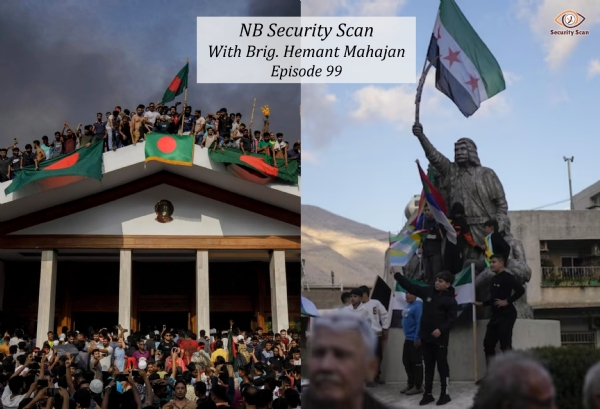
The event was hosted by the All-Party Parliamentary Group (APPG) for British Sikhs, whose secretariat operates within the Sikh Federation, a pro-Khalistan political entity linked to the banned International Sikh Youth Federation.
Labour’s Key Figures Involved in the Event
Among the attendees was Preet Kaur Gill, a Labour MP for Edgbaston and Parliamentary Private Secretary to Jonathan Reynolds, the UK Business and Trade Secretary. Reynolds is set to lead negotiations on the India-UK Free Trade Agreement (FTA).
Gill’s presence at the event could be perceived by India as tacit support for pro-Khalistan elements within the Labour Party. Her controversial stance on Sikh separatism, including previous comments supporting Sikh self-determination and campaigning for the release of convicted terrorist Jagtar Singh Johal, further complicates the optics.
Other Labour figures present included Jas Athwal, a Labour MP with a controversial reputation, Harpreet Uppal, MP for Huddersfield, and Labour Councillor Parbinder Kaur, known for her overt support of Sikh separatist narratives.
Implications for India-UK Trade Negotiations
India and the UK have held over a dozen rounds of negotiations on an FTA since 2022, with discussions focused on key issues such as relaxed visa rules and reduced fees for Indian professionals and students. The agreement holds immense potential for Britain, as it could open lucrative markets for British cars, Scotch whisky, and financial services, especially with India poised to become the world's third-largest economy.
India’s Concerns Over Khalistani Extremism
India has consistently flagged concerns about Khalistani extremism in the UK. External Affairs Minister S. Jaishankar raised these issues with British leaders during his UK visit, emphasizing the need to prevent misuse of free speech for extremist propaganda.
The 2023 attack on the Indian High Commission in London by pro-Khalistan protesters heightened tensions, leading to a formal diplomatic protest from India. These incidents have intensified India’s scrutiny of pro-Khalistan activities in the UK and their influence on British politics.
The Khalistan Factor and the Canada Connection
The UK government must also consider the broader implications of the Khalistan issue on its foreign relations. The ongoing diplomatic row between India and Canada over Khalistani extremists underscores New Delhi’s zero-tolerance policy toward such groups.
If the UK fails to address India’s concerns regarding Khalistani influences within its political system, it risks undermining its relationship with India at a critical juncture in FTA negotiations.
Labour’s Path to Securing a Trade Deal
For Labour, striking an FTA with India is a strategic priority, particularly as Britain seeks to strengthen its post-Brexit trade ties. However, the party cannot afford to be seen as a harbor for pro-Khalistan elements, especially given the historical friction caused by former Labour leader Jeremy Corbyn’s anti-India stance.
To ensure a successful deal, the Labour government must actively distance itself from Khalistani groups and address India’s concerns transparently. Any perception of support for Sikh separatism within the UK political establishment could derail the hard-fought progress toward a landmark FTA.
Bangladesh: A Regime-Change Operation Turned Into Anti Hindu Jihad
Instability in India’s Neighborhood: A Growing Concern
The potential for Western forces to destabilize India’s neighborhood, seeking opportunities to disrupt India’s growth story, is a matter of grave concern. Recent events in Bangladesh exemplify this risk and highlight the consequences of external interference.
The Protests Against Sheikh Hasina: Organic or Engineered?
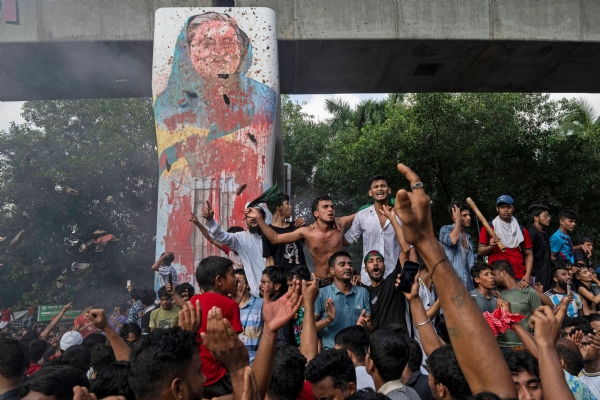
When mass protests erupted against Sheikh Hasina’s 15-year tenure as Prime Minister of Bangladesh, they initially appeared to be organic. These protests had all the hallmarks of a large-scale public dissent: participation of student groups, political opposition leaders driving the narrative, public grievances over government policies such as reservation quotas, and substantial financial support sustaining the movement.
Historically, such a combination often leads to significant unrest, with police or military intervention escalating the situation into violence. This, in turn, fuels further protests in a vicious cycle capable of toppling governments. However, questions arose about the source of the substantial financial resources fueling these protests, revealing a troubling connection.
The Deep State Connection
A trail of monetary transactions pointed towards involvement by the Western deep state. Prime Minister Sheikh Hasina herself, shortly after seeking refuge in India, suggested that the protests were hijacked by the United States’ deep state, allegedly aiming to secure a naval base in the Bay of Bengal. This theory gained further credence with the appointment of Muhammad Yunus as Chief Advisor to the Bangladesh government—a figure seemingly groomed for this role.
Sheikh Hasina remains the democratically elected Prime Minister of Bangladesh, whereas Yunus is a leader imposed by external forces. His appointment marks a significant deviation from democratic norms, leading to severe consequences for the nation.
The Decline of Democracy and Rising Atrocities
Under Yunus’ regime, Bangladesh has witnessed the systematic erosion of its democratic fabric. State-sponsored violence against Hindus and other minorities has intensified, undermining the country’s secular ethos. Bangladesh, once a melting pot of diverse religious communities, is rapidly being transformed into an Islamic state through targeted pogroms.
Houses of Hindus and other minorities are raided, individuals attacked and killed, properties stolen, and places of worship desecrated. The regime’s actions have made it clear that Bangladesh is no longer a functioning democracy. Western powers, meanwhile, appear indifferent to these atrocities, further complicating the situation.
India’s Role and the Way Forward
India has historically opted for strategic patience in its neighborhood. As Pakistan nears collapse, India is prepared to wait out Bangladesh’s current turmoil as well. The Citizenship (Amendment) Act (CAA) already provides a safety net for persecuted minorities, reaffirming India’s position as a bastion of religious freedom and democracy.
Public sentiment in Bangladesh may eventually shift, mirroring trends in Balochistan and Gilgit, where appreciation for India’s economic and democratic success is growing. However, India must remain vigilant against attempts by Western forces to exploit instability in its neighborhood for their gain.
Lessons for the Western World
The West must confront its hypocrisy and acknowledge the inhumane atrocities being perpetrated under Yunus’ regime. These state-sponsored acts of terror demand a decisive and immediate response. While regime-change operations may have succeeded in Ukraine, Syria, Iraq, Afghanistan, and now Bangladesh, India’s robust democratic institutions and vigilant electorate make it impervious to such tactics.
The Western world’s selective disregard for human rights and democratic principles in South Asia serves as a stark reminder of the dangers of external interference. It is imperative for the international community to uphold justice and democratic integrity, not only for the sake of Bangladesh but for regional stability as a whole.
How India is protesting against Hindu attacks in Bangladesh
No Tourists, No Hospital Services: India’s Protests Against Hindu Attacks in Bangladesh
India-Bangladesh relations are witnessing a sharp decline as reports of attacks on Hindus in Bangladesh continue to surface. In response, several sectors in India have taken measures to express their dissatisfaction, including a boycott of Bangladeshi tourists and patients. Additionally, flights and trade between the two countries have been significantly disrupted.
Deteriorating Diplomatic Ties
India and Bangladesh, once considered friendly neighbors, now face strained relations. The situation escalated following the ousting of Sheikh Hasina as Bangladesh’s leader through a popular student uprising. Her departure, followed by Nobel laureate Muhammad Yunus’ interim government’s alleged inaction to protect minorities, has added to the tension. New Delhi has voiced concerns over the safety of minorities in Bangladesh, particularly after the arrest of former ISKCON monk Chinmoy Krishna Das.
Trade Relations Take a Hit
Trade, a cornerstone of India-Bangladesh relations, is also under strain. Bangladesh, India’s largest trading partner in South Asia, faces mounting trade suspensions:

Sutarkandi Land Port Shutdown: The Exporters & Importers Association in Assam’s Sribhumi district announced the suspension of trade through the Sutarkandi land port, halting exports of essential goods like stone, rice, coal, and fresh fruits.
Export Embargo: West Bengal’s BJP leader Suvendu Adhikari called for an indefinite export embargo, warning of stricter restrictions unless Bangladesh’s interim government addresses attacks on Hindus.
Protests and Burnings: Congress MLA Kamalakhya Dey Purkayastha led a protest burning Bangladeshi goods and personally blocked trade routes.
These actions have disrupted cross-border trade, significantly impacting the economic exchange between the two nations.
Decline in Flights and Cross-Border Transport
The unrest has also impacted transportation links:
Reduced Flights: The number of flights between Bangladesh and India has sharply declined. In July, 205 flights carried over 42,000 passengers between Kolkata and Bangladesh. By November, this number had halved to just 96 flights, with fewer than 23,000 passengers.
Truck Traffic Slumps: Cross-border truck movement has also diminished. For instance, daily truck entries through the Ghojadanga land port in Basirhat have halved from 400 to about 200.
Bangladeshi Tourists Face Boycotts
Indian tourism operators have taken a firm stance against Bangladeshi tourists:
Hotel Ban: The All-Tripura Hotel and Restaurant Owners’ Association announced that Bangladeshi tourists will not be provided accommodations or meals.
Mission Breach Incident: Over 50 protesters entered the Bangladeshi mission premises in Agartala, escalating tensions and prompting police action, including suspensions and detentions.
Decline in Tourist Numbers: Political unrest has led to a sharp drop in Bangladeshi tourists visiting India, decreasing from 2.12 million in 2023 to 1.29 million as of August 2024.
Medical Services Boycott
Indian hospitals have also joined the protests:
North Kolkata Hospital Ban: The Jitendra Narayan Ray Hospital in Manicktala declared it would no longer treat Bangladeshi nationals.
Tripura Hospital Stance: ILS Hospitals in Agartala echoed similar sentiments, citing the mistreatment of Hindus in Bangladesh.
This decision could significantly impact medical tourism between the two nations. In 2023, over 300,000 Bangladeshi medical tourists sought treatment in India, a figure that has already seen a decline amidst the ongoing tensions.
Statements from Bangladesh’s Leadership
Bangladesh’s interim government has acknowledged the changing dynamics of its relationship with India. Nobel laureate and interim leader Muhammad Yunus stated in a New York Times interview that India’s portrayal of Bangladesh as becoming “like Afghanistan” has further strained ties. He warned that destabilizing Bangladesh would have ripple effects across the region.
Foreign Affairs Adviser Touhid Hossain also recognized the shift, calling for a pragmatic approach to rebuilding ties in the new geopolitical reality.
Navigating the Future
The escalating tensions between India and Bangladesh have far-reaching implications for the region’s political and economic stability. It is imperative for both nations to address their differences and restore their historically strong ties to ensure peace and mutual prosperity.
End the Deep State Within Government Stop Lending Credibility to Those Who Despise India
AIBF 2024: A Troubling Indicator of Negligence
The Ahmedabad International Book Festival (AIBF) 2024 has once again highlighted a disturbing trend within the government: the failure to adequately vet guests invited to official events. Organized by the Ahmedabad Municipal Corporation (AMC) in collaboration with the Union Education Ministry and the National Book Trust (NBT), AIBF showcased speakers and authors who actively disparage Indian values, propagate divisive narratives, and ridicule the government.
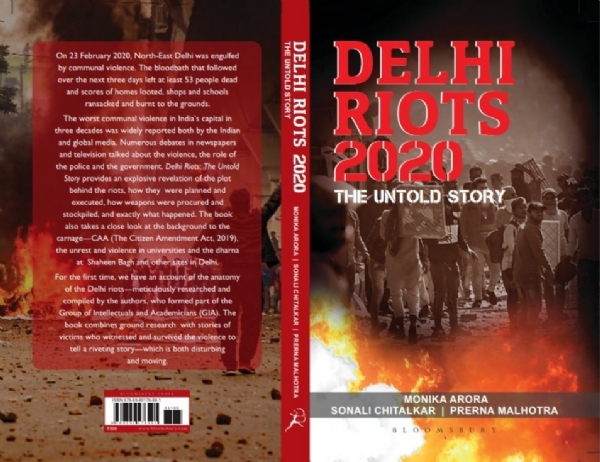
Prominent invitees such as William Dalrymple, Savie Karnel, and Kiran Manral exemplify this issue. Dalrymple, notorious for his Hindutva criticism, previously pressured Bloomsbury to withdraw the book Delhi Riots 2020: The Untold Story. Karnel’s book The Nameless God perpetuates a faux-secularist perspective on the Babri Masjid demolition, while Manral’s social media activity consistently aligns with narratives that demean India’s democratic institutions and cultural resurgence.
A web search would have exposed these invitees’ problematic positions. Yet, the event proceeded, showcasing a severe lapse in judgment by the organizers.
Persistent Lapses in Government Events
The AIBF debacle is not an isolated incident. Similar controversies have plagued government-sponsored events in recent years:
Devdutt Pattanaik at Sahitya Akademi: In November 2024, Pattanaik was invited to inaugurate a seminar despite his consistent anti-Hindu rhetoric. Social media outrage eventually led to the event’s cancellation.
Nadav Lapid at IFFI: In 2022, the Israeli filmmaker disparaged The Kashmir Files as "vulgar propaganda" while serving as the IFFI jury head.
Yoga Diluted by AYUSH Ministry: Yoga was reduced to a "glow-up ritual," distancing it from its Hindu spiritual origins. Similarly, Ira Trivedi, an advocate for beef consumption, hosted a yoga show on Doordarshan.
These repeated failures suggest systemic issues within cultural ministries and their affiliated bodies, raising serious concerns about accountability and competence.
Consequences of Poor Cultural Policies
The government’s consistent oversight in aligning cultural policies with public sentiment has long-term consequences:
Erosion of Cultural Identity: By platforming individuals hostile to Indian values, the state alienates its nationalist base and emboldens critics who undermine India’s heritage.
Impact on Collective Psyche: The younger generation, influenced by distorted narratives, risks internalizing biases that disconnect them from their roots, leaving them culturally adrift.
Perception of Complacency: The absence of accountability fosters a culture of impunity, where officials face no repercussions for repeated blunders.
The Path Forward: Structured Vetting and Accountability
To address these recurring issues, a comprehensive and structured approach is necessary:
1. Establish Cultural Gatekeepers
Each ministry should engage a panel of advisors with expertise in Indian culture, history, and ideology. These advisors would ensure that platforms funded by the state remain free from distorted agendas.
2. Introduce a Rigorous Vetting Process
A transparent system to scrutinize invitees’ backgrounds and alignments is essential. This would prevent individuals with conflicting ideologies from dominating significant cultural platforms.
3. Enforce Accountability
Officials who repeatedly fail to perform due diligence should face tangible consequences. This would foster a culture of responsibility and reduce instances of negligence.
4. Prioritize Ideological Clarity
The government must ensure that its cultural policies resonate with the aspirations of its supporters. Initiatives such as revising NCERT textbooks and addressing historical apologia perpetuated by institutions like the Archaeological Survey of India (ASI) must be expedited.
Time Is Running Out
The government’s inability to course-correct risks alienating its core supporters and losing the cultural mandate it has worked hard to build. The window for implementing meaningful changes is narrowing, and failure to act decisively will have lasting repercussions. Cultural events, textbooks, websites, and media—all must align with the ethos of the nation to nurture a generation that values its heritage.
The battle for the nation’s cultural and ideological identity cannot be fought indefinitely at the base level. It is time to build upon the foundation and secure the legacy for future generations. The stakes are too high for complacency or negligence.
Nepal PM Oli’s Visit to China: High on Optics, Low on Content
A Balancing Act with Limited Gains
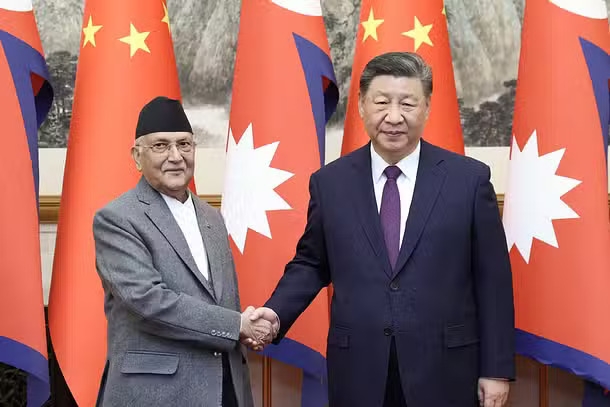
Nepal Prime Minister KP Sharma Oli’s recent visit to China (December 2-5) aimed to signal a strategic balancing of relations between India and China. However, despite the optics, the outcomes appear modest. Over the past decade, China has increased its influence in Kathmandu through political alliances, infrastructure promises, and initiatives in trade and tourism. Yet, tangible benefits for Nepal remain elusive.
Key Meetings and Agreements
Leading a 78-member delegation, PM Oli met Chinese Premier Li Qiang, President Xi Jinping, and legislative head Zhao Leji. A nine-point agreement was issued on December 3, highlighting:
- The Tokha-Chhare tunnel project to connect with the Tibet border.
- Enhancements in trade.
- Reconstruction of the Basantpur Durbar (damaged in the 2015 earthquake).
- Export of buffalo meat.
- A $41 million cash assistance package.
- Deployment of Chinese language teachers.
- Cooperation in economic, technical, and media exchanges.
- Challenges with the Belt and Road Initiative (BRI)
Despite signing into China’s BRI in 2017, Nepal has struggled to implement its 35 proposed projects due to policy disagreements and political opposition. China’s insistence on a “harmonious clause”—a euphemism for tight Chinese controls—has deterred progress. Learning from Sri Lanka’s debt crisis and the underutilization of Pokhara airport (built with a $216 million Chinese loan), Nepal has refrained from seeking loans, favoring grants instead. However, Beijing continues to push costly projects, including a railway connecting Tibet to Kathmandu, whose estimated cost exceeds Nepal’s GDP.
Controversial Infrastructure Projects
Several infrastructure projects involving China have faced setbacks:
Budhi Gandhak Dam Project: Signed in 2017 by PM Dahal, canceled by PM Deuba later that year, renewed by PM Oli in 2018, and finally scrapped in 2022 due to environmental and financial concerns.
West Seti Dam Project: A $1.6 billion agreement signed in 2012 was scrapped in 2018 due to escalating costs and protests.
Telecommunications and the Digital Silk Road
Nepal has deepened its telecommunications partnership with China. Contracts for mobile data services and the Next Generation Network (NGN) were awarded to ZTE Corporation and Huawei. Maintenance services are handled by Asian Info, aligning Nepal with China’s “digital silk road” initiative. These agreements grant significant control to China over Nepal’s communication infrastructure.
Expansion of Cultural Influence
A significant agreement during the visit was the deployment of more Chinese-language teachers to Nepal. The Confucius Institute, established in 2007 at Kathmandu University, has facilitated cultural exchanges, although similar institutes have faced closures in the West over espionage concerns.
Lingering Bilateral Issues
Despite increased Chinese tourism, Nepal’s economy suffers from e-payment fraud linked to Chinese platforms. A $2 billion annual trade deficit persists, while Chinese investments show little growth. Border trade routes remain unreliable due to natural disasters and infrastructure challenges. Nepal also lacks significant remittance inflows from China.
Strained Relations and Unrealized Promises
Nepal’s participation in Chinese-led initiatives like the BRI and Bo Ao Forum for Asia has not yielded substantial benefits. While adhering to China’s “one-China” policy and restricting Tibetan refugees, Nepal has received limited reciprocal gestures. Border disputes have emerged, with China allegedly removing border pillars in several districts, adding to Nepal’s discomfort.
A Costly Balancing Act
Nepal’s attempt to counterbalance India through closer ties with China has brought minimal rewards. Despite high-profile visits and agreements, the tangible benefits for Nepal remain underwhelming, leaving Kathmandu to reassess its strategic partnerships and their implications for national sovereignty and development.
The Impact of the Assad Regime's Fall on the Power Dynamics in West Asia & India
Introduction: A Turning Point in the Syrian Civil War
The recent developments in the Syrian civil war have reverberated globally, marking a significant shift in the region's geopolitical landscape. The ousting of President Bashar al-Assad by Syrian rebels, led by the Islamist alliance Hayat Tahrir al-Sham (HTS) and the Turkish-backed Syrian National Army, signals the end of over 13 years of brutal conflict. The rapid fall of key cities, including Damascus, reflects a profound change in public sentiment and minimal resistance to the rebellion.
Geopolitical Shifts: A New Landscape
Iran: A Strategic Defeat
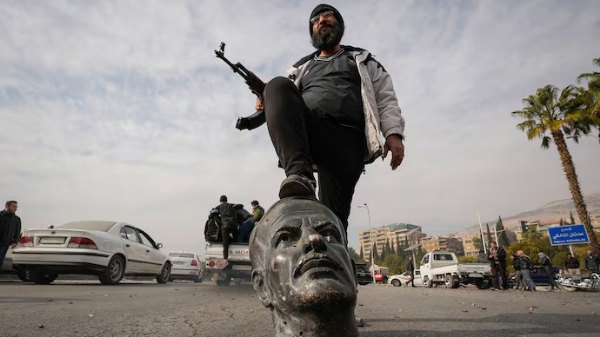
The collapse of Assad's regime represents a significant setback for Iran and its regional ambitions. Iran's "Shiite Crescent," which extends from Lebanon to Yemen, is now under threat. The decline of Iranian influence is evident as HTS has targeted Iranian establishments in Damascus, signaling a weakening of Tehran's foothold in the region.
Russia: Limits of Influence
For Russia, Assad's fall is a major blow to its geopolitical standing in the Middle East. Overextended by the war in Ukraine and facing Western sanctions, Moscow was unable to provide the necessary support to maintain Assad's regime. The rapid loss of strategic cities underscores a diminishing Russian influence, as highlighted by President-elect Donald Trump's comments regarding this failure.
Turkey: Expanding Role
Conversely, Turkey has emerged as a significant player in the aftermath of Assad's fall. By supporting rebel groups like HTS, Turkey seeks to assert its influence over northern Syria while addressing domestic pressures related to Kurdish autonomy and the influx of Syrian refugees.
Israel: Navigating New Risks
Israel faces a complex set of challenges with Assad's departure. While a weakened Iranian presence aligns with its interests, the possibility of an Islamist-led government raises new concerns. Israel's ongoing airstrikes to counter Iranian militias underscore its commitment to maintaining security amid this uncertainty.
The United States: Strategic Dilemmas
The U.S. continues to grapple with its role in Syria, balancing the need to prevent an ISIS resurgence with the complexities of engaging with HTS, a group with a controversial past. While President-elect Trump has expressed reluctance to intervene, the presence of U.S. troops remains crucial for regional stability, highlighting the delicate balance of power in the area.
India: Seeking Stability
India's response to the changing situation reflects its priorities in protecting its citizens while navigating regional complexities. With approximately 90 Indians still in Syria, New Delhi has issued travel advisories, emphasizing the need for peace and stability in the region.
A Fragile Political Transition
Despite the end of Assad's regime, Syria's future remains uncertain. The rapid advances of rebel forces mask deep divisions among opposition groups, raising concerns about potential internal conflict akin to post-2003 Iraq. The emergence of extremist factions, including ISIS, poses a significant threat to stabilization efforts.
Prime Minister Mohammad Ghazi al-Jalali has called for free elections and unity, reaching out to HTS leader Abu Mohammed al-Golani in an unprecedented effort to shape a transitional government. However, Golani's group's Islamist roots may complicate international recognition and support.
Regional Powers and Uncertain Alliances
Regional players, such as the United Arab Emirates, express apprehension about HTS's rising influence. UAE Presidential Advisor Anwar Gargash has emphasized the need for moderation and inclusive governance in Syria. While Israel welcomes a diminished Iranian presence, it remains cautious of the potential for Islamist rule near its borders.
Efforts to mediate a political resolution are essential. The global community, regional stakeholders, and the United Nations must work collaboratively to prevent Syria from descending into chaos, akin to Iraq's failed state scenario. Yet, conflicting interests among Turkey, the U.S., Russia, and Iran hinder prospects for lasting peace.
Conclusion: A Test of Diplomacy
The fall of the Assad regime signifies a pivotal moment for the Middle East and the world. As Syria enters a new era, the challenges of rebuilding a fractured nation, the threat of extremist resurgence, and the complexities of international diplomacy loom large. The outcome of these dynamics will determine whether Syria's future is marked by peace or peril, serving as a critical test for global diplomacy in the region.
--
